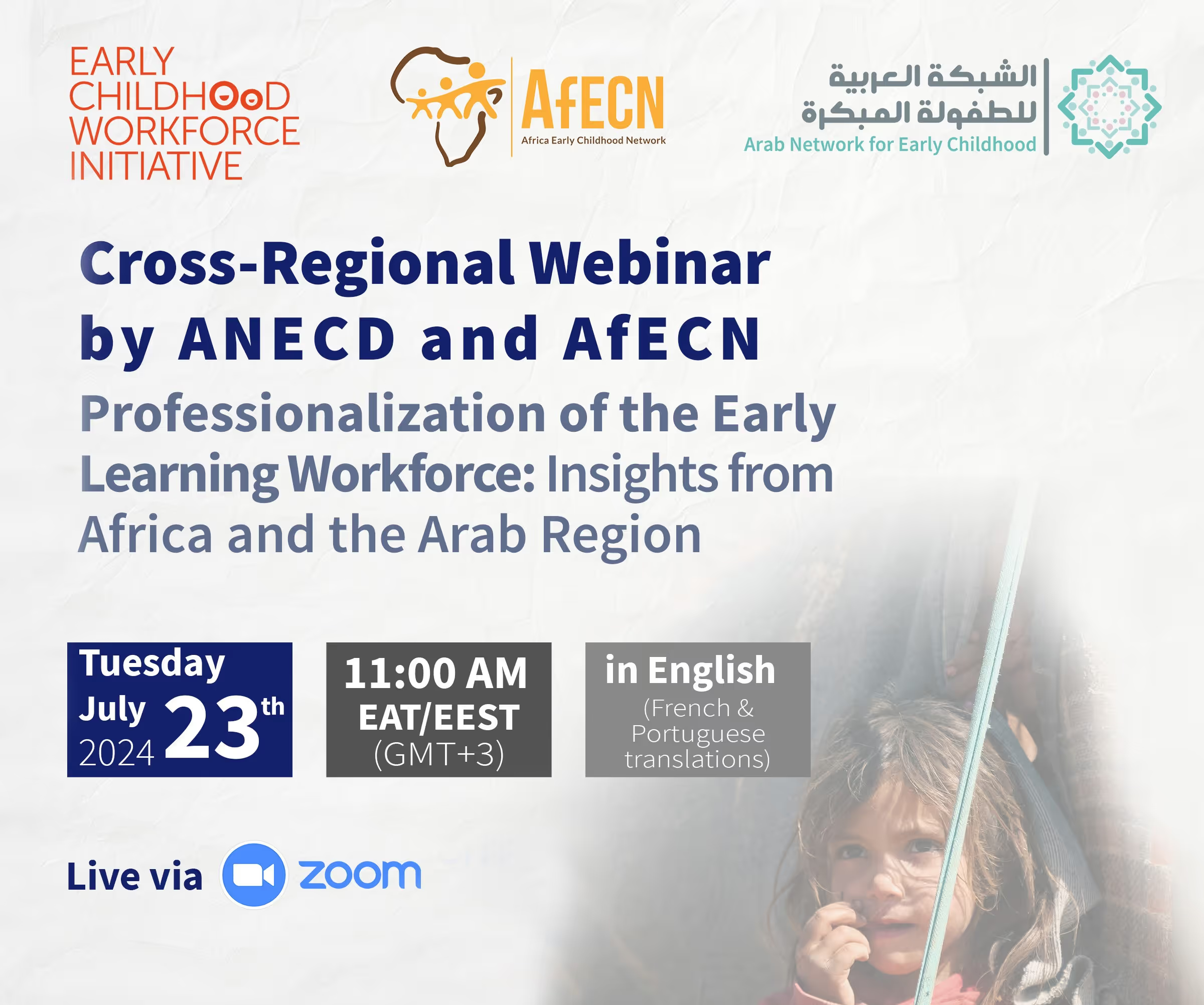On July 23, 2024, early childhood development experts from across Africa, the Arab regions, and beyond convened for a pivotal Cross-Regional Webinar. The event, organized by the Africa Early Childhood Network (AfECN) and the Arab Network for Early Childhood Development (ANECD) under the Early Childhood Workforce Initiative (ECWI), aimed to address the pressing challenges facing the professionalization of the early learning workforce.
The webinar gathered 290+ stakeholders who are committed to advancing the early childhood workforce. Participants included members of four early childhood regional networks—AfECN, International Step by Step Association (ISSA), Asia-Pacific Regional Network for Early Childhood (ARNEC), and ANECD—along with the AU CESA ECED Cluster Quality Working Group, field practitioners, researchers, policy makers, and more.
The event’s objectives were to increase knowledge on the status of the early learning workforce in Africa and the Arab regions, share experiences and best practices for professionalization, and discuss strategies for future research and policy advocacy. It provided a crucial platform for dialogue and knowledge exchange on a topic of growing importance in global early childhood education systems.
Key Insights and Evidence
The discussion began with a comprehensive landscape analysis of the early learning workforce in Sub-Saharan Africa, delivered by Prof Hasina Banu Ebrahim, Professor and UNESCO co-chair in early childhood care, education and development. Her research underscored the fragmented and vulnerable state of the workforce, predominantly composed of women who face systemic inequities in pay and working conditions.
"The early learning workforce in Africa is a broken workforce made-up of a majority of women who are in dire need of systemic change,” Professor Ebrahim noted, pointing to a need for deeper investment and reform.
This finding was echoed by ECD and ECE expert, specialist, and lead researcher of the landscape analysis of the EC workforce status in the Arab countries, Dr. Garene Kaloustian. She highlighted the vast discrepancies between public and private sector early childhood programs, with the public sector often suffering from underfunding and low standards. Both regions share common challenges, including high turnover rates and a lack of union support for early childhood educators.
Strategic Solutions and Policy Recommendations
Participants explored policy options and strategic interventions to address these gaps. Discussions centered around the need for multi-sectoral coordination and government investment. A case study from The Gambia, presented by Dr. David Baysah from ADARA Research and Management Consultancy showcased the importance of creating clear career development pathways for early childhood educators, while Dr. Anil Khamis from Aga Khan Institute for Human Development emphasized the need for inclusive education policies.
“At the systemic level, we really need multi-sectoral coordination… we need to create strategic plans that prioritize inclusivity and strengthen institutional capacity.”
- Dr. Anil Khamis,
Faculty Research Professor at Aga Khan University
Institute for Human Development
The current state of the workforce is alarming. More specifically, two million teachers and caregivers are needed for early childhood education to reach the SDG target of universal coverage in Eastern & Southern Africa by 2030. In the Arab countries, in addition to the multidimensional cross-regional crises that affect the working conditions and development of early childhood workforce, the field is witnessing a shortage in the human resources who can thrive through this critical period. In its 2022 conference report, the International Labour Organization (ILO) reported that investing in early childhood care and education would create 6 million jobs in 12 Arab countries out of the 22 countries.
The event emphasized that achieving this target will require significant policy reform, investment in training, and better data to guide decision-making.
The webinar concluded with a call to action for more cross-regional collaboration and evidence-based policymaking, aiming to secure quality early childhood education provision in Africa and the Arab regions.




